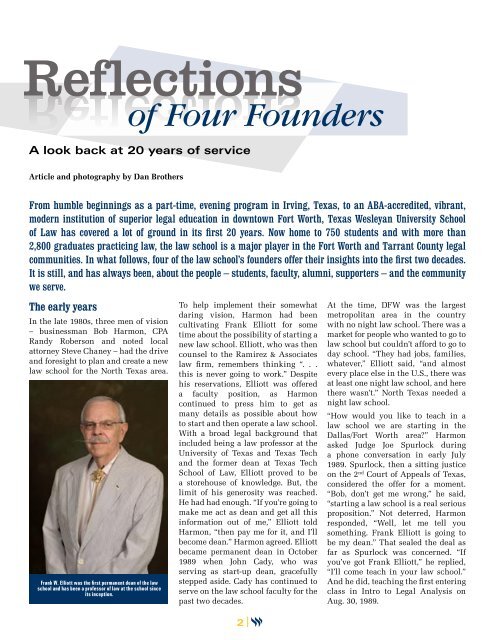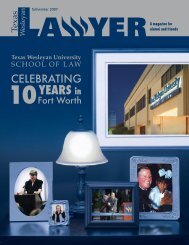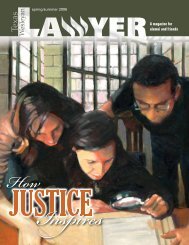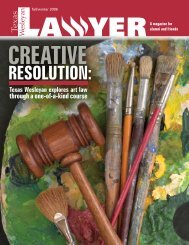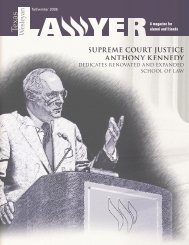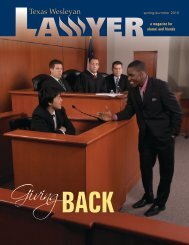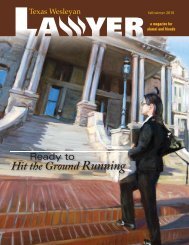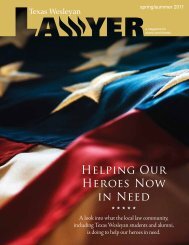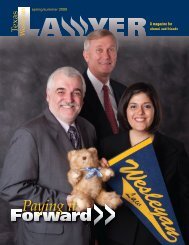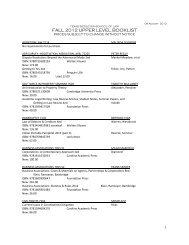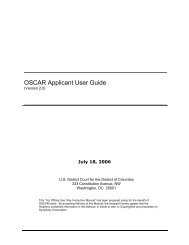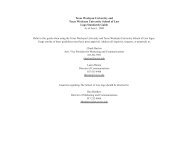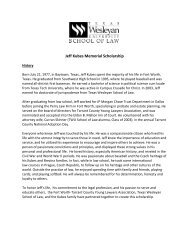Reflections - Texas Wesleyan School of Law - Texas Wesleyan ...
Reflections - Texas Wesleyan School of Law - Texas Wesleyan ...
Reflections - Texas Wesleyan School of Law - Texas Wesleyan ...
You also want an ePaper? Increase the reach of your titles
YUMPU automatically turns print PDFs into web optimized ePapers that Google loves.
<strong>Reflections</strong><br />
<strong>of</strong> Four Founders<br />
A look back at 20 years <strong>of</strong> service<br />
Article and photography by Dan Brothers<br />
From humble beginnings as a part-time, evening program in Irving, <strong>Texas</strong>, to an ABA-accredited, vibrant,<br />
modern institution <strong>of</strong> superior legal education in downtown Fort Worth, <strong>Texas</strong> <strong>Wesleyan</strong> University <strong>School</strong><br />
<strong>of</strong> <strong>Law</strong> has covered a lot <strong>of</strong> ground in its fi rst 20 years. Now home to 750 students and with more than<br />
2,800 graduates practicing law, the law school is a major player in the Fort Worth and Tarrant County legal<br />
communities. In what follows, four <strong>of</strong> the law school’s founders <strong>of</strong>fer their insights into the fi rst two decades.<br />
It is still, and has always been, about the people – students, faculty, alumni, supporters – and the community<br />
we serve.<br />
The early years<br />
In the late 1980s, three men <strong>of</strong> vision<br />
– businessman Bob Harmon, CPA<br />
Randy Roberson and noted local<br />
attorney Steve Chaney – had the drive<br />
and foresight to plan and create a new<br />
law school for the North <strong>Texas</strong> area.<br />
Frank W. Elliott was the fi rst permanent dean <strong>of</strong> the law<br />
school and has been a pr<strong>of</strong>essor <strong>of</strong> law at the school since<br />
its inception.<br />
To help implement their somewhat<br />
daring vision, Harmon had been<br />
cultivating Frank Elliott for some<br />
time about the possibility <strong>of</strong> starting a<br />
new law school. Elliott, who was then<br />
counsel to the Ramirez & Associates<br />
law fi rm, remembers thinking “. . .<br />
this is never going to work.” Despite<br />
his reservations, Elliott was <strong>of</strong>fered<br />
a faculty position, as Harmon<br />
continued to press him to get as<br />
many details as possible about how<br />
to start and then operate a law school.<br />
With a broad legal background that<br />
included being a law pr<strong>of</strong>essor at the<br />
University <strong>of</strong> <strong>Texas</strong> and <strong>Texas</strong> Tech<br />
and the former dean at <strong>Texas</strong> Tech<br />
<strong>School</strong> <strong>of</strong> <strong>Law</strong>, Elliott proved to be<br />
a storehouse <strong>of</strong> knowledge. But, the<br />
limit <strong>of</strong> his generosity was reached.<br />
He had had enough. “If you’re going to<br />
make me act as dean and get all this<br />
information out <strong>of</strong> me,” Elliott told<br />
Harmon, “then pay me for it, and I’ll<br />
become dean.” Harmon agreed. Elliott<br />
became permanent dean in October<br />
1989 when John Cady, who was<br />
serving as start-up dean, gracefully<br />
stepped aside. Cady has continued to<br />
serve on the law school faculty for the<br />
past two decades.<br />
2<br />
At the time, DFW was the largest<br />
metropolitan area in the country<br />
with no night law school. There was a<br />
market for people who wanted to go to<br />
law school but couldn’t afford to go to<br />
day school. “They had jobs, families,<br />
whatever,” Elliott said, “and almost<br />
every place else in the U.S., there was<br />
at least one night law school, and here<br />
there wasn’t.” North <strong>Texas</strong> needed a<br />
night law school.<br />
“How would you like to teach in a<br />
law school we are starting in the<br />
Dallas/Fort Worth area?” Harmon<br />
asked Judge Joe Spurlock during<br />
a phone conversation in early July<br />
1989. Spurlock, then a sitting justice<br />
on the 2nd Court <strong>of</strong> Appeals <strong>of</strong> <strong>Texas</strong>,<br />
considered the <strong>of</strong>fer for a moment.<br />
“Bob, don’t get me wrong,” he said,<br />
“starting a law school is a real serious<br />
proposition.” Not deterred, Harmon<br />
responded, “Well, let me tell you<br />
something. Frank Elliott is going to<br />
be my dean.” That sealed the deal as<br />
far as Spurlock was concerned. “If<br />
you’ve got Frank Elliott,” he replied,<br />
“I’ll come teach in your law school.”<br />
And he did, teaching the fi rst entering<br />
class in Intro to Legal Analysis on<br />
Aug. 30, 1989.


